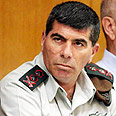

IDF Chief of Staff Lieutenant-General Gabi Ashkenazi appointed a special team of high-ranking officers on Wednesday to study the final report of the Winograd Commission; a 617-page conclusive review and analysis of Israel's conduct during the Second Lebanon War.
Retired Justice Eliyahu Winograd presented the final report to the public in a press-conference on Wednesday evening, scant hours after submitting it to Prime Minister Ehud Olmert and Defense Minister Ehud Barak. Though the wartime political echelon emerged relatively unscathed from the report, the army was shouldered with the majority share of the blame for Israel's inability to achieve a decisive victory against Hizbullah.
The team appointed by Ashkenazi - comprised of the Military advocate general, IDF spokesman, chairman of the Israeli Military Court of Appeals and heads of the Plans and Policy Directorate and Teleprocessing Branch - has been charged with studying the report and comparing it to the military's own internal probe into the war.
Earlier Wednesday the military expressed concerns over any criticism directed at individual officers who are still serving within the IDF's ranks. Conclusions drawn in it regards to officers who have since retired – former IDF Chief of Staff Lieutenant-General Dan Halutz, former Head of Northern Command, Major-General Udi Adam and former Head of the Galilee Division Gal Hirsh – will not affect the IDF.
'Revolutionary changes'
The IDF has made sure it has all the answers needed to rebut whatever arguments rose regarding the military, thus attempting to send the message that the military had already identified all the major failures during its own probe of the war, implementing the lessons learnt accordingly.
Senior IDF sources said Wednesday that some of the changes made were not short of "revolutionary", but admitted that the military would not be able to objectively asses their efficiency until the next large military operation.
The IDF has named over 70 teams to probe the war's ongoings and results soon after the ceasefire was called. Each team was complied of various experts; 10 of the teams inspected issues directly relevant to the General Staff; 23 teams looked into issues generally relevant to the General Staff and the rest dealt with field related issues.
The IDF declared 2007 the "military readiness year," bur some of the changed initiated will not be fully in place for the next few years, since the process has to take into consideration the military's immediate operational needs.
So what has been done so far? The IDF has updated its perception of operation, putting a new emphasis on interfacing, training and strengthening ground maneuvers capability.
The military's definition of DEFCON (defense readiness condition) has been redefined, as well as the process of switching from calm to emergency situations. The army has also rewritten in operative contingency, this time using clear, professional terms.
Updating protocols, contingencies
One of the IDF's biggest changes was regarding training protocols, recently holding a large-scale general divisions exercise, in which it implemented most of the Second Lebanon War's lessons, including interfacing with the various government bureaus. The IDF has also doubled its investments in training.
The military has further approved a NIS 250 billion ($68.8 billion) perennial work plan – Tephen – which includes the continuance manufacturing of Merkava 4 tanks, purchasing of hundreds of ATC (armored personnel carrier) vehicles, reinforcing the Air Force with additional F-15 fighter jets and the Navy with war ships, as well as accelerating the development of anti-missile systems.
Other changes in the military involve redefining the responsibilities of many divisions and bureaus. Military intelligence created a unit charged with liaising with intelligence factors in the field; and officers' training continuity has been redefined to ensure it through the ranks.
The IDF has re-stocked on its ammunitions and equipment since the war's end, but nevertheless, several deficiencies still exist and are due to be replenished over the next fire years, costing some NIS 2 billion ($550 million). The IDF has been able to replenish all of its medical supplies.















